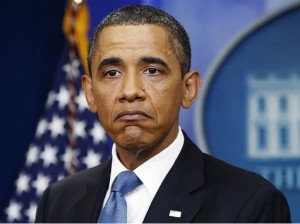Says he toppled Gaddafi to avert a humanitarian crisis, but failed to do the same in Syria
by Daniel Wiser • Washington Free Beacon
 Recent remarks by President Obama highlight his conflicting approach to dictators in the Middle East, critics say, opening him to charges of an inconsistent and contradictory strategy toward regimes and humanitarian crises in the region.
Recent remarks by President Obama highlight his conflicting approach to dictators in the Middle East, critics say, opening him to charges of an inconsistent and contradictory strategy toward regimes and humanitarian crises in the region.
In his final press conference of the year Friday, Obama defended his efforts to topple former Libyan autocrat Muammar Gaddafi in 2011 as part of an international coalition. Gaddafi was “a dictator who was threatening and was in a position to carry out the wholesale slaughter of large numbers of people,” he said. He added that the United States and allied nations worked “to avert a big humanitarian catastrophe that would not have been good for us.”
“Those who now argue, in retrospect, we should have left Gaddafi in there seem to forget that he had already lost legitimacy and control of his country, and we could have—instead of what we have in Libya now, we could have had another Syria in Libya now,” he said.
Unlike in Libya, Obama has declined to apply substantial pressure on the regime of Syrian dictator Bashar al-Assad throughout four years of civil war, critics say. Despite declaring in 2011 that, “the time has come for President Assad to step aside,” Obama chose not to launch airstrikes against the Assad regime after it used chemical weapons in 2013, an apparent violation of a “red line” set by the president.
Additionally, the administration scrapped its train-and-equip program for Syrian rebels in October after acknowledging that it had been a failure and had only yielded a few battle-ready fighters.
As a result, analysts say Syria has become the locus of one of the world’s worst humanitarian crises in decades, with more than a quarter of a million people dead and millions of refugees fleeing to neighboring countries and Europe. Amid the chaos of the civil war, ISIS established a base of operations in the country and used Assad’s brutality as a recruiting tool to attract foreign fighters and disillusioned Sunni Muslims in the region.
Michael Rubin, a former Pentagon official and Middle East expert at the American Enterprise Institute, said that Obama has prioritized rhetoric over action in Syria.
“There is a window of opportunity when resolving any crisis, but rather than pass through that window, Obama prefers simply to admire his own reflection,” Rubin said. “Had he acted early in Syria, he could have contained or resolved a problem before it metastasized.”
The White House declined to comment on Obama’s divergent approaches to Libya and Syria.
Libya, too, has devolved into a civil war after Gaddafi’s fall and become a safe haven for ISIS. The terrorist group has established a significant presence in parts of the country with about 5,000 fighters.
Obama admitted on Friday that his administration should have “some accountability for not moving swiftly enough and underestimating the need to rebuild government [in Libya] quickly.”
The president’s mistake in Libya, Rubin said, was not attempting to prevent a humanitarian disaster but rather failing to help Libya establish security and governing institutions after Gaddafi’s ouster.
“Obama’s real failure was to refuse to secure Gaddafi’s weapons depots,” he said. “The instability across the Sahel can be traced to Obama’s fateful decision to lead from behind.”
The United Nations Security Council announced Friday it had endorsed a new plan to end Syria’s civil war, including a new constitution and elections in 18 months. However, the fate of Assad under such a transition remains unclear.
Obama said at the press conference that “Assad is going to have to leave in order for the country to stop the bloodletting.” Yet there might be more wiggle room for the authoritarian leader. A political transition should aim to assure Russia and Iran—two staunch allies of Assad—that “their equities are respected” in Syria, Obama said.